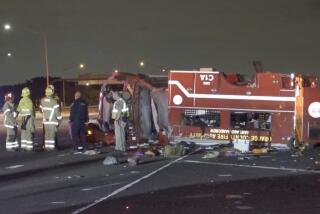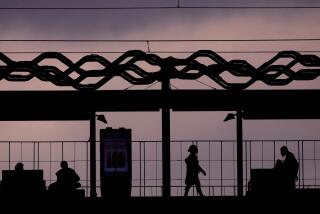New do’s and don’ts considered for Venice Beach boardwalk
The boisterous Venice Beach boardwalk could become considerably more sedate pending a new edict from Los Angeles city leaders to the drum circles, DJs and would-be guitar heroes who perform on the famed pedestrian strip: Quiet down after dark.
Facing more than 500 noise complaints from boardwalk neighbors over the last 20 months, the Los Angeles City Council directed city lawyers Tuesday to draft new rules, including a ban on musical instruments and amplified sound between sunset and 9 a.m. Council members also hope to grant new authority to the Los Angeles Police Department to ensure that performers who attract big crowds rotate in and out of shared spaces. The council is considering expanding an existing lottery that parcels out space to certain activists and performers, making it a year-round system rather than just in the summer and fall.
Regulations for the boardwalk, a historic performance and free-speech zone that draws visitors from around the world, have been mired in complaints and legal challenges for years. Even though an ordinance was crafted under federal court supervision and approved by the council in April 2008, city officials are still struggling with enforcement problems and fierce competition for space that sometimes has resulted in fistfights.
A group of merchants, performers and free-speech advocates told council members Tuesday that the changes do nothing to address what they consider the root of the boardwalk problems -- the proliferation of illegal commercial vending on the ocean side that is crowding out longtime activists and drawing business away from merchants who operate legally on the east side.
Stephen L. Fiske, a professional musician and 35-year resident of Venice, described the 2008 law as “complicated, confusing and unenforceable.”
“These ordinances have been ineffective and have been a failure,” Fiske said in council chambers Tuesday. “We want our boardwalk back.”
Therese Dietlin told members that last year’s ordinance, with its lottery system for certain zones, has invited more “wholesale, retail [and] cheap junk from China” onto the boardwalk.
“The free speechers, the performers and the artists who were meant to be there -- and who are the draw to all those people who come to Venice to see what’s going on -- have been essentially driven out,” Dietlin said.
Last year’s ordinance, fashioned under the guidance of U.S. District Judge Dean D. Pregerson after earlier rules were challenged on 1st Amendment grounds, divided the west side of the boardwalk into zones.
Permits are required through a year-round lottery system for individuals in “i-zones” who want to sell certain “expressive” items that are “inextricably intertwined” with their message such as paintings, photographs, sculptures or books they have written.
Meanwhile, entertainers, activists and others seeking spots in the p-zones are required to get a permit through a lottery system that operates only between Memorial Day and November. With a p-zone permit, they are allowed to peddle newspapers, leaflets, pamphlets, bumper stickers, patches, buttons and their books or performance recordings.
But some longtime activists, such as Robert “Jingles” Newman, who has a vegan booth, have refused to participate in the lottery.
Jingles told council members Tuesday that the increased demand for spots is being driven entirely by commercial vendors.
“The lottery makes it nearly impossible for me to get a space, and if it goes all year round, that will be the end of myself and all the activists on the boardwalk,” he said.
Councilman Bill Rosendahl, who wrote Tuesday’s motion, said it was a first step toward creating a more peaceful environment for boardwalk business owners and residents, but he said his office is still exploring alternatives to the lottery.
“We need to find a mechanism to get rid of that commercialization on the west side,” he said.
Twitter.com/LATimesReston
More to Read
Sign up for Essential California
The most important California stories and recommendations in your inbox every morning.
You may occasionally receive promotional content from the Los Angeles Times.











